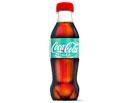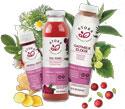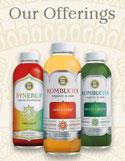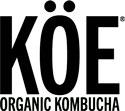Coca-Cola
Coca-Cola Unveils Sample Bottles Made From Recovered, Recycled Ocean Plastic
 The Coca-Cola Company is introducing a new bottle made using a technology that recovers and recycles discarded low-grade marine plastic. The company says the technology could someday be used to transform plastic ocean debris into food-grade packaging for food or drinks. Coca-Cola said about 300 sample bottles have been produced using 25 percent recycled marine plastic retrieved from the Mediterranean Sea and beaches. The innovative process breaks down the components of plastic and strips out impurities in lower-grade recyclables so they can be rebuilt. The technology was developed in partnership with the “Circular Seas” coastal clean-up project, Dutch recycling firm Ioniqa Technologies, and Indorama Ventures, a supplier of PET plastic and packaging solutions.[Image Credit: © The Coca-Cola Company]
The Coca-Cola Company is introducing a new bottle made using a technology that recovers and recycles discarded low-grade marine plastic. The company says the technology could someday be used to transform plastic ocean debris into food-grade packaging for food or drinks. Coca-Cola said about 300 sample bottles have been produced using 25 percent recycled marine plastic retrieved from the Mediterranean Sea and beaches. The innovative process breaks down the components of plastic and strips out impurities in lower-grade recyclables so they can be rebuilt. The technology was developed in partnership with the “Circular Seas” coastal clean-up project, Dutch recycling firm Ioniqa Technologies, and Indorama Ventures, a supplier of PET plastic and packaging solutions.[Image Credit: © The Coca-Cola Company]
Other Companies
Beverage Formulators Have An Expanding Toolbox Of Sweetening Agents
 The beverage industry has taken notice of changing consumer expectations about the sugar content of their drinks, so sweetening agents are playing a greater role in product formulation. But the ideal formulation of sweeteners varies across categories and consumer preferences: some want less sugar but the same taste; others want less sugar and less sweetness, too. In a world where “clean label” dominates consciousness, product development can be a challenge: “most of the time it requires a toolbox of sweeteners,” says Jim Carr of Tate & Lyle. The goal is to deliver great taste while cutting calories and added sugars from the nutrition facts panel. Among the ingredients being heavily tested are stevia, monk fruit, erythritol, and allulose. Tate & Lyle, for example, offers Dolcia Prima, an allulose sweetener that helps developers reduce high levels of sugar while maintaining taste. But allulose is just the beginning: even more rare sugars are on the way, along with an array of enzymatically-created steviol glycosides.[Image Credit: © Couleur from Pixabay]
The beverage industry has taken notice of changing consumer expectations about the sugar content of their drinks, so sweetening agents are playing a greater role in product formulation. But the ideal formulation of sweeteners varies across categories and consumer preferences: some want less sugar but the same taste; others want less sugar and less sweetness, too. In a world where “clean label” dominates consciousness, product development can be a challenge: “most of the time it requires a toolbox of sweeteners,” says Jim Carr of Tate & Lyle. The goal is to deliver great taste while cutting calories and added sugars from the nutrition facts panel. Among the ingredients being heavily tested are stevia, monk fruit, erythritol, and allulose. Tate & Lyle, for example, offers Dolcia Prima, an allulose sweetener that helps developers reduce high levels of sugar while maintaining taste. But allulose is just the beginning: even more rare sugars are on the way, along with an array of enzymatically-created steviol glycosides.[Image Credit: © Couleur from Pixabay]
Start-Up Gets Ready To Launch Decaf-Removing Product Next May
.jpg&width=125&height=118) A chemical engineer from the University of Washington has come up with an economical way to decaffeinate coffee and tea on the fly. Founder and president of Decafino Andy Liu says the new product, which will launch next May, looks like a tea bag and can be dunked in 16 ounces of coffee or tea to decaffeinate the beverage within five minutes. Small beads in the pouch attract and bind with caffeine through a physical process called adsorption. The ingredients (plant extracts and earth minerals) and materials are natural, making the pouches biodegradable and environmentally friendly. Liu says his company will focus on selling the Decaf Pouches directly to cafés and coffee shops for use in their existing caffeinated products. Though only 10 percent of a café's daily coffee sales are decaf, the beverages require a separate coffee grinder and equipment, which takes up physical space and is an added cost. Decafino is raising money through a Kickstarter campaign.[Image Credit: © Decafino, Inc.]
A chemical engineer from the University of Washington has come up with an economical way to decaffeinate coffee and tea on the fly. Founder and president of Decafino Andy Liu says the new product, which will launch next May, looks like a tea bag and can be dunked in 16 ounces of coffee or tea to decaffeinate the beverage within five minutes. Small beads in the pouch attract and bind with caffeine through a physical process called adsorption. The ingredients (plant extracts and earth minerals) and materials are natural, making the pouches biodegradable and environmentally friendly. Liu says his company will focus on selling the Decaf Pouches directly to cafés and coffee shops for use in their existing caffeinated products. Though only 10 percent of a café's daily coffee sales are decaf, the beverages require a separate coffee grinder and equipment, which takes up physical space and is an added cost. Decafino is raising money through a Kickstarter campaign.[Image Credit: © Decafino, Inc.]
Dutch Dairy Cooperative Unveils RTD Coffee Brand
 Dutch multinational dairy cooperative Royal FrieslandCampina has introduced an RTD coffee brand exclusively for the convenience store and wholesale markets. Dubbed Barista Coffee Co, the brand will launch in two flavors: traditional Caffe Latte and Caramel Latte (250 ml, RRP of $1.22). The company plans to introduce more flavors before the end of the year.[Image Credit: © Royal FrieslandCampina ]
Dutch multinational dairy cooperative Royal FrieslandCampina has introduced an RTD coffee brand exclusively for the convenience store and wholesale markets. Dubbed Barista Coffee Co, the brand will launch in two flavors: traditional Caffe Latte and Caramel Latte (250 ml, RRP of $1.22). The company plans to introduce more flavors before the end of the year.[Image Credit: © Royal FrieslandCampina ]
Health-Ade Adds Grape-Based Kombucha To Portfolio
.jpg&width=125&height=153)
Kombucha maker Health-Ade (Torrance, Calif.) has launched Grape Vibes, a new SKU made from original kombucha (fermented tea) and cold-pressed organic California grapes. The product debuts on the heels of Health-Ade’s last launch, Tropical Punch, and will retail for $3.99/16 oz. The company says it is promoting the new products with a new marketing campaign – “You Brew You” – this month with print and digital ads in Allure, GQ, Vanity Fair, Us Weekly and OK! through 2020. Health-Ade’s organic product line now has 16 flavors fermented in glass to prevent plastic or metal leaching.[Image Credit: © Health-Ade LLC]
Ocean Spray’s First New Brand Atoka To Debut Functional Herb-based Beverages
 Ocean Spray Cranberries, Inc. (Middleborough, Mass.) announced the launch of its first-ever new brand. Atoka, a line of herbal plant-based functional beverages, is the first from Lighthouse, Ocean Spray’s new innovation incubator. The Atoka brand portfolio includes tea tonics, oat milk elixirs, and herbal shots in four herbal blended flavors: Herbal Blend: 01 combines cranberry, guayusa, ginseng, and ginger blended to elevate focus; Blend: 02 (elderberry, reishi, rosehips, ginger, and spices) supports wellness; Blend: 03 (dark cherry, chamomile, hops, ginger) encourages relaxation; and Blend: 04 (cranberry, linden flower, lemongrass, orange peel, ginger) improves digestion. Atoka oatmilk and Ocean Spray Atoka beverages will be test marketed in the Boston area and then roll out across the country in January 2020.[Image Credit: © Ocean Spray Cranberries, Inc]
Ocean Spray Cranberries, Inc. (Middleborough, Mass.) announced the launch of its first-ever new brand. Atoka, a line of herbal plant-based functional beverages, is the first from Lighthouse, Ocean Spray’s new innovation incubator. The Atoka brand portfolio includes tea tonics, oat milk elixirs, and herbal shots in four herbal blended flavors: Herbal Blend: 01 combines cranberry, guayusa, ginseng, and ginger blended to elevate focus; Blend: 02 (elderberry, reishi, rosehips, ginger, and spices) supports wellness; Blend: 03 (dark cherry, chamomile, hops, ginger) encourages relaxation; and Blend: 04 (cranberry, linden flower, lemongrass, orange peel, ginger) improves digestion. Atoka oatmilk and Ocean Spray Atoka beverages will be test marketed in the Boston area and then roll out across the country in January 2020.[Image Credit: © Ocean Spray Cranberries, Inc]
Packaging Firms Struggle With Misconception About Recyclability Of Plant-Based Cartons
 Packaging suppliers are aware that an increasing number of beverage brands acknowledge the environmental benefits of carton packaging and are switching from other packaging materials. Evergreen Packaging (Memphis, Tenn.), a supplier to New Barn Organics (Healdsburg, Calif.), announced earlier this year that New Barn is transitioning its almond milk line from plastic packaging to Evergreen’s PlantCarton paper packaging. According to New Barn, customers told the company that a transition to plant-based packaging versus petroleum-based packaging is right for the brand. Evergreen’s PlantCarton packages are made with at least 70 percent renewable material; paper made from trees where responsible forestry practices are used, the company says. PlantCarton packaging is also recyclable. But a big problem remains for carton packaging companies: the misconception among many consumers that cartons are not recyclable, despite the fact that carton recycling has grown 240 percent since 2009.[Image Credit: © janjf93 from Pixabay]
Packaging suppliers are aware that an increasing number of beverage brands acknowledge the environmental benefits of carton packaging and are switching from other packaging materials. Evergreen Packaging (Memphis, Tenn.), a supplier to New Barn Organics (Healdsburg, Calif.), announced earlier this year that New Barn is transitioning its almond milk line from plastic packaging to Evergreen’s PlantCarton paper packaging. According to New Barn, customers told the company that a transition to plant-based packaging versus petroleum-based packaging is right for the brand. Evergreen’s PlantCarton packages are made with at least 70 percent renewable material; paper made from trees where responsible forestry practices are used, the company says. PlantCarton packaging is also recyclable. But a big problem remains for carton packaging companies: the misconception among many consumers that cartons are not recyclable, despite the fact that carton recycling has grown 240 percent since 2009.[Image Credit: © janjf93 from Pixabay]
Peet’s Coffee Launches Line Of RTD Coffee Blends
 Berkeley, Calif.-based specialty roaster Peet’s Coffee previewed a new line of four RTD coffees at the National Association of Convenience Stores (NACS) trade show earlier this month. The Chocolate Truffle, Caramel Dulce, Vanilla Crème, and Coffee & Cream blends are made with real cream, sugar, and single-origin Colombian coffee. They will be available beginning in January at convenience stores, grocery stores, mass retailers, and drug stores in California, distributed by Keurig Dr Pepper. Each Peet’s Blended Coffee flavor comes in a 13.7-fluid-ounce glass bottle with a suggested retail price of $2.99 to $3.49.[Image Credit: © PEET'S COFFEE]
Berkeley, Calif.-based specialty roaster Peet’s Coffee previewed a new line of four RTD coffees at the National Association of Convenience Stores (NACS) trade show earlier this month. The Chocolate Truffle, Caramel Dulce, Vanilla Crème, and Coffee & Cream blends are made with real cream, sugar, and single-origin Colombian coffee. They will be available beginning in January at convenience stores, grocery stores, mass retailers, and drug stores in California, distributed by Keurig Dr Pepper. Each Peet’s Blended Coffee flavor comes in a 13.7-fluid-ounce glass bottle with a suggested retail price of $2.99 to $3.49.[Image Credit: © PEET'S COFFEE]
GT’s Living Foods Debuts Less Sour Line Of Water-Based Kefir Beverages

Probiotic food and beverage company GT’s Living Foods (Beverly Hills, Calif.) has launched a line of aqua kefir fermented beverages with a less acidic taste profile than kombucha. The idea behind the new product line is to make it easier for those unfamiliar with fermented beverages to give them a try. Unlike dairy kefir, water kefir is made by combining water and dried fruit then adding non-dairy kefir cultures known as aqua gems, tibicos (in Mexico), and Japanese water crystals. Water kefir is fermented for a few days, releasing lactic acid in the process. Described as a “lightly flavored, bright and crisp, sparkling probiotic drink,” the Aqua Kefir line has begun rolling out among select U.S. retailers, including Sprouts Farmers Market, Gelson's Markets, and Bristol Farms in California. Each bottle contains 50 calories and 12 g of sugar (six g of added sugar) in coconut lime (with coconut water), peach pineapple, pear ginger, and pomegranate flavors, each with an SRP of $3.99.[Image Credit: © GT’s Living Foods]
Peet’s Abandons DSD Effort To Focus On Shelf-Stable RTD Coffees
 Berkeley, Calif.-based specialty roaster Peet’s Coffee is no longer interested in building a regional cold chain distribution system. The company earlier this year shuttered its Coldcraft direct store distribution network and discontinued its bottled cold brew line, instead focusing efforts on developing shelf-stable RTD coffee products. Established in 2017, Coldcraft focused on cold brew coffee innovation, creating a West Coast DSD network to distribute refrigerated products like kegs and Revive Kombucha. The effort “splintered” the company, however, so it will now focus on becoming a “national player” in shelf-stable cold brew beverages. “We’re still going to market with cold distribution, it’s just not our company-owned fleet,” a representative says.[Image Credit: © Peets Coffee]
Berkeley, Calif.-based specialty roaster Peet’s Coffee is no longer interested in building a regional cold chain distribution system. The company earlier this year shuttered its Coldcraft direct store distribution network and discontinued its bottled cold brew line, instead focusing efforts on developing shelf-stable RTD coffee products. Established in 2017, Coldcraft focused on cold brew coffee innovation, creating a West Coast DSD network to distribute refrigerated products like kegs and Revive Kombucha. The effort “splintered” the company, however, so it will now focus on becoming a “national player” in shelf-stable cold brew beverages. “We’re still going to market with cold distribution, it’s just not our company-owned fleet,” a representative says.[Image Credit: © Peets Coffee]
KÖE Tinkers With Flavors As It Seeks To Expand Audience For Canned Kombucha
 Canned kombucha maker KÖE debuted two new flavors at the recent National Association of Convenience Stores (NACS) show following a year of market testing and adjusting its formula, first introduced in Southern California last year. The original shelf-stable formulation, which contained 80-90 calories per 12 oz. can, has been reduced to 35 calories, eight grams of sugar, and 13 to 16 grams of carbohydrates. In addition, the old raspberry lemon flavor is now strawberry lemonade, and lemon ginger became lemon lime. KÖE kept the blueberry ginger, raspberry dragon fruit, and mango flavors. According to the company, the blueberry ginger flavor is ideal for native kombucha drinkers, but the fruitier flavors should appeal to kombucha newbies. KÖE will stick with the more portable wide-mouth aluminum can format to ensure smoother liquid flow and an “unadulterated taste,” and because aluminum is more sustainable and recyclable. The first production run of the new flavors begins this month, with a national rollout planned for early 2020.[Image Credit: © KÖE]
Canned kombucha maker KÖE debuted two new flavors at the recent National Association of Convenience Stores (NACS) show following a year of market testing and adjusting its formula, first introduced in Southern California last year. The original shelf-stable formulation, which contained 80-90 calories per 12 oz. can, has been reduced to 35 calories, eight grams of sugar, and 13 to 16 grams of carbohydrates. In addition, the old raspberry lemon flavor is now strawberry lemonade, and lemon ginger became lemon lime. KÖE kept the blueberry ginger, raspberry dragon fruit, and mango flavors. According to the company, the blueberry ginger flavor is ideal for native kombucha drinkers, but the fruitier flavors should appeal to kombucha newbies. KÖE will stick with the more portable wide-mouth aluminum can format to ensure smoother liquid flow and an “unadulterated taste,” and because aluminum is more sustainable and recyclable. The first production run of the new flavors begins this month, with a national rollout planned for early 2020.[Image Credit: © KÖE]
Copyright 2026 Business360, Inc.

